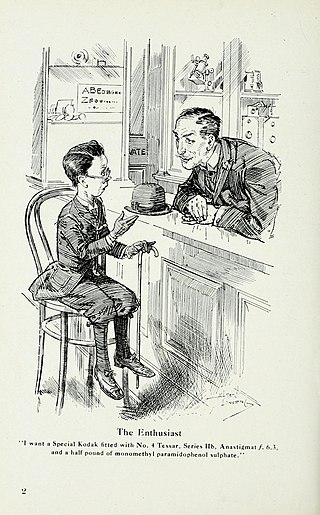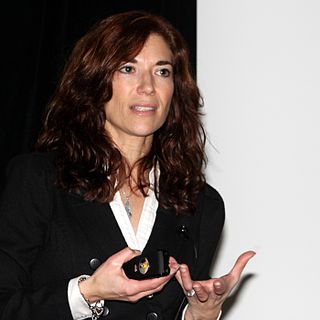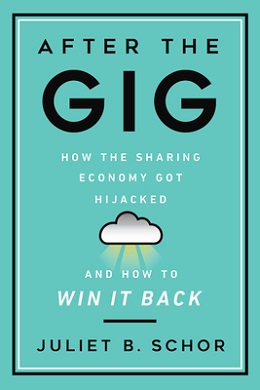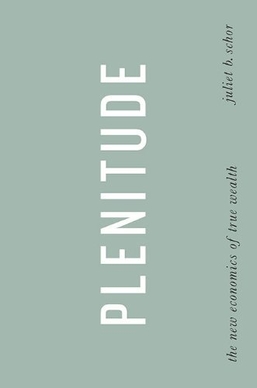
A consumer is a person or a group who intends to order, or use purchased goods, products, or services primarily for personal, social, family, household and similar needs, who is not directly related to entrepreneurial or business activities. The term most commonly refers to a person who purchases goods and services for personal use.
In social behavior, downshifting is a trend where individuals adopt simpler lives from what critics call the "rat race".

A Veblen good is a type of luxury good, named after American economist Thorstein Veblen, for which the demand increases as the price increases, in apparent contradiction of the law of demand, resulting in an upward-sloping demand curve. The higher prices of Veblen goods may make them desirable as a status symbol in the practices of conspicuous consumption and conspicuous leisure. A product may be a Veblen good because it is a positional good, something few others can own.

Juliet B. Schor is an American economist and Sociology Professor at Boston College. She has studied trends in working time, consumerism, the relationship between work and family, women's issues and economic inequality, and concerns about climate change in the environment. From 2010 to 2017, she studied the sharing economy under a large research project funded by the MacArthur Foundation. She is currently working on a project titled "The Algorithmic Workplace" with a grant from the National Science Foundation.
Daniel G. Goldstein is an American cognitive psychologist known for the specification and testing of heuristics and models of bounded rationality in the field of judgment and decision making. He is an honorary research fellow at London Business School and works with Microsoft Research as a principal researcher.
Children's culture includes children's cultural artifacts, children's media and literature, and the myths and discourses spun around the notion of childhood. Children's culture has been studied within academia in cultural studies, media studies, and literature departments. The interdisciplinary focus of childhood studies could also be considered in the paradigm of social theory concerning the study of children's culture.

Anti-consumerism is a sociopolitical ideology that is opposed to consumerism, the continual buying and consuming of material possessions. Anti-consumerism is concerned with the private actions of business corporations in pursuit of financial and economic goals at the expense of the public welfare, especially in matters of environmental protection, social stratification, and ethics in the governing of a society. In politics, anti-consumerism overlaps with environmental activism, anti-globalization, and animal-rights activism; moreover, a conceptual variation of anti-consumerism is post-consumerism, living in a material way that transcends consumerism.

Food marketing is the marketing of food products. It brings together the food producer and the consumer through a chain of marketing activities.
Toy advertising is the promotion of toys through a variety of media. Advertising campaigns for toys have been criticized for trading on children's naivete and for turning children into premature consumers. Advertising to children is usually regulated to ensure that it meets defined standards of honesty and decency. These rules vary from country to country, with some going as far as banning all advertisements that are directed at children.
Advertising to children refers to the act of advertising products or services to children as defined by national laws and advertising standards.
The Diderot effect is a phenomenon that occurs when acquiring a new possession leads to a spiral of consumption that results in the acquisition of even more possessions. In other words, it means that buying something new can cause a chain reaction of buying more and more things because the new item makes one feel like one needs other things to go with it or to keep up with it. This can lead to overspending and accumulating more possessions than one actually needs or uses. The term was coined by anthropologist and scholar of consumption patterns Grant McCracken in 1988, and is named after the French philosopher Denis Diderot (1713–1784), who first described the effect in an essay.

Consumer socialization is the process by which young people acquire skills, knowledge and attitudes relevant to their functioning as consumers in the marketplace. It has been argued, however, that consumer socialization occurs in the adult years as well. This field of study is a subdivision of consumer behavior as its main focus is on how childhood and adolescent experiences affect future consumer behavior. It attempts to understand how factors such as peers, mass media, family, gender, race, and culture play an influence in developing customer behavior.
The United States food and beverage industry has increased the amount of advertising that intensively and aggressively targets children through multiple channels. Food marketers know that the youth consumers have equal if not more spending power than adults, they hold purchasing influence, and have the potential to be lifelong consumers. The advertisements for products predominantly high in sugar and fat have increased and have had an effect on the major health epidemic in the US of Childhood obesity, and as such are inconsistent with national dietary recommendations. Food advertisements have moved from the television into the classroom. Marketing companies are exploring new creative techniques to reach their target audience, young children, through promotions, contests, and incentive programs. As a result, the US has progressively been placing regulations on how much advertising is allowed during children's programming.

Huck's Raft is a history of American childhood and youth, written by Steven Mintz. The 2006 H-Net review wrote that the book was the best single-volume history of its kind.

Deirdre K. Breakenridge is an American author and businessperson. She is known for her writing on public relations and social media.

The Community of Scholars is a 1962 book about higher education by Paul Goodman with his observations on its function and proposals for its future.
The 40th Venice Biennale, held in 1982, was an exhibition of international contemporary art, with 38 participating nations. The Venice Biennale takes place biennially in Venice, Italy. No prizes were awarded this year or in any Biennale between 1968 and 1986.
The Overspent American: Upscaling, Downshifting, and the New Consumer is a 1998 book by Juliet Schor on American consumer spending patterns.

After the Gig: How the Sharing Economy Got Hijacked and How to Win It Back is a 2020 book by Juliet Schor.

True Wealth: How and Why Millions of Americans are Creating a Time-Rich, Ecologically Light, Small-Scale, High-Satisfaction Economy is a 2010 book by Juliet Schor that argues for a redefinition of wealth based on allocation of free time, making things for oneself, environmentally-aware consumption, and stronger social connections.











